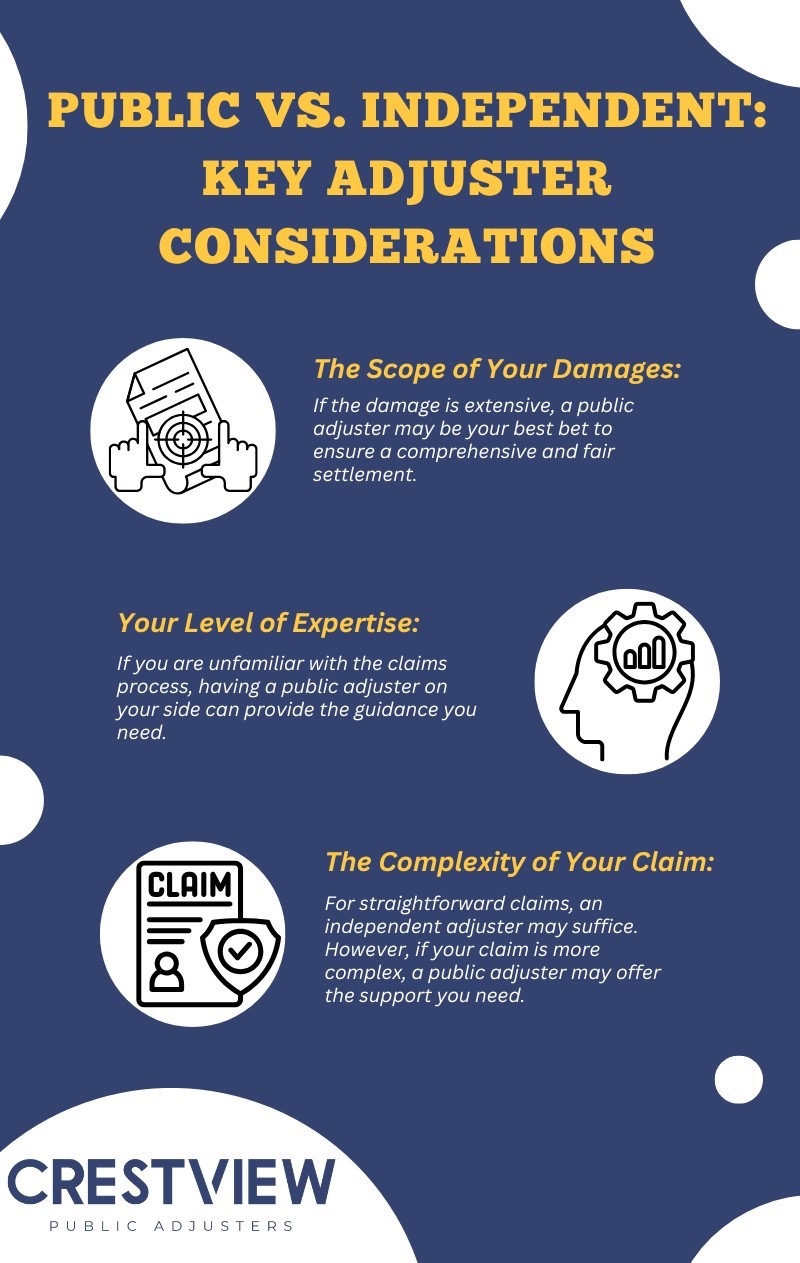Key Points:
- Public adjusters and independent adjusters serve different roles in the insurance claims process.
- Public adjusters work for policyholders, while independent adjusters work for insurance companies.
- Understanding the differences can help you make the right decision when filing a claim.
Navigating the insurance claims process, one of the most important decisions you can make is choosing the right adjuster to represent you. Understanding the roles of public adjusters and independent adjusters can significantly impact the outcome of your claim. Let’s dive into the key differences between these two types of adjusters to help you make an informed decision.
What is a Public Adjuster?
A public adjuster is an independent professional hired by policyholders to help them file and manage their insurance claims. Their job is to represent the interests of the policyholder, ensuring that they receive a fair settlement for their damages. Public adjusters are licensed by the state and are typically paid a percentage of the settlement they secure for their clients.
Their primary responsibilities include:
- Assessing Damages: Public adjusters evaluate the extent of the damage to your property, reviewing all aspects thoroughly.
- Negotiating with the Insurance Company: They work directly with the insurance company to negotiate a fair settlement on your behalf.
- Filing Claims: Public adjusters handle the paperwork and filing of claims, ensuring everything is submitted accurately and on time.
The role of a public adjuster is crucial, especially when dealing with complex or disputed claims. They advocate for you, the policyholder, ensuring that your best interests are at the forefront throughout the claims process.
What is an Independent Adjuster?
An independent adjuster, unlike a public adjuster, works on behalf of the insurance company, not the policyholder. Their responsibility is to investigate claims, assess damages, and determine the amount the insurance company should pay for a claim. Independent adjusters are typically contracted by insurance companies rather than working as full-time employees.
Their key duties include:
- Investigating the Claim: Independent adjusters conduct inspections, gather evidence, and document the damage to assess the legitimacy of the claim.
- Evaluating the Damages: They estimate the cost of repairs or replacement of the damaged property.
- Reporting to the Insurance Company: After completing their evaluation, they report their findings to the insurance company, providing them with the necessary information to determine the payout.
While independent adjusters are skilled professionals, their loyalty lies with the insurance company. This can sometimes lead to conflicts of interest, as their goal is to minimize the amount paid out in claims.

How Do Public Adjusters and Independent Adjusters Differ?
The main difference between a public adjuster and an independent adjuster lies in who they represent. Public adjusters work for the policyholder, while independent adjusters work for the insurance company. Understanding these roles is essential for policyholders to make informed decisions when filing claims.
Here’s a breakdown of their key differences:
- Representation:
- Public adjusters represent the policyholder.
- Independent adjusters represent the insurance company.
- Payment Structure:
- Public adjusters are typically paid a percentage of the final settlement, meaning their income is tied to the outcome of your claim.
- Independent adjusters are paid by the insurance company, often with a flat fee or per-case basis.
- Expertise:
- Public adjusters have a deep understanding of policyholders’ rights and will work to ensure they receive the best possible outcome.
- Independent adjusters are experts in assessing damage but ultimately work in the best interest of the insurance company.
- Conflict of Interest:
- Public adjusters are solely focused on advocating for the policyholder’s interests.
- Independent adjusters may have a conflict of interest, as their job is to reduce the payout for the insurance company.
When Should You Hire a Public Adjuster?
There are certain situations where hiring a public adjuster is especially beneficial for policyholders. If you’ve experienced significant damage, have a complex claim, or feel that your insurance company isn’t offering a fair settlement, a public adjuster can be a valuable asset. They can help ensure that you get the compensation you deserve without leaving money on the table.
The Role of Public Adjusters in Complex Claims
In more complicated claims, such as those involving large-scale property damage or business interruption, public adjusters can be indispensable. They can help you navigate the intricate details of your policy and make sure you are properly compensated for every aspect of your loss. In situations like these, independent adjusters may not provide the same level of attention or advocacy.
How Public Adjusters Can Help Maximize Your Settlement
Public adjusters have the expertise to uncover hidden damages and missed aspects of a claim that independent adjusters might overlook. For example, if your claim involves water damage, public adjusters may identify areas that need restoration but are not immediately visible, such as mold or structural issues behind walls. This thoroughness can result in a significantly higher payout.
Key Considerations When Choosing Between a Public Adjuster and Independent Adjuster
Deciding between a public adjuster and an independent adjuster involves several factors to consider. These include:

Public Adjuster vs Independent Adjuster: Which One Should You Choose?
Ultimately, the decision comes down to what is best for you as the policyholder. If you value having an advocate who will fight for your best interests and work to maximize your payout, hiring a public adjuster is likely the right choice. However, if your claim is relatively simple and you feel confident handling negotiations with the insurance company, an independent adjuster may be sufficient.
Contact a Professional Public Adjuster Today
If you’re a policyholder in New York, New Jersey, or Florida and are ready to make sure your claim is handled with the expertise it deserves, reach out to Crestview Public Adjusters today. We specialize in maximizing settlements and ensuring you get the compensation you’re entitled to. Don’t leave money on the table—let us advocate for you every step of the way. Contact Crestview Public Adjusters Now

